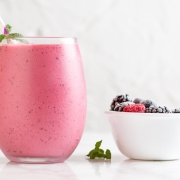Going back to school can be an exciting time. Getting to see friends you maybe haven’t seen in a while, diving back into a routine, and the inevitable fun (but sometimes corny) school events. However, this time can also come with a lot of extra stressors. A routine shift can often throw a wrench into our eating and lifestyle patterns we were used to over the summer. Maybe this looks like a different eating schedule, less rest, or busyness causing a need to be more diligent in nourishing ourselves. While it might be overwhelming at first, there are some tangible ways we can set ourselves up for nutritional success when diving back into school.
- Eating on campus. All school campuses (whether college or high school) have a dining hall/cafeteria available for students. Universities might have varying degrees to their meal plans, with packages ranging from only a few meals a week to every meal. To determine which meal plan might be best for you, consider; how often will I be on campus? Will I be on campus during my preferred meal/snack times? Do they serve options that work for my allergies/food preferences (most will!)? If you know you will be headed to class around the time you tend to eat lunch, it might be beneficial to purchase a meal plan, and plan to arrive on campus a little early to get in a meal before heading to class! If you know you will be getting out of class around a preferred snack time you could utilize the dining hall and stop by for a snack. Universities also will have on campus restaurants (that you can often use your universities points or meal plan dollars at) that can offer a range of meal and snack options! Be thinking of your schedule and proximity to on campus restaurants and dining halls to get a feel of how you might utilize these resources available to you!
- Bringing meals to campus. Planning ahead for meals, while classes keep you away from home, is a great way to set yourself up for success. Packing a balanced meal (containing protein, carbohydrates, and fats) to have between classes ensures you have access to food when you need it. This is crucial in making sure you aren’t extending times between eating to an undesirable point. Some tips are to pack foods that you enjoy, foods that will last a few hours after being unrefrigerated/not frozen, or that you can quickly heat up using a microwave on campus. Make sure to use a lunchbox and ice pack to keep foods at a safe storing temperature!
- Bringing snacks to campus. Say you won’t be on campus for long or over mealtimes, but you know there is a possibility of anything popping up. You might run into friends who invite you to study with them, decide to stop by the event you just saw a flier for on your walk to class, or your body might just decide it wants some fuel. Having a snack on hand at all times can make sure that any unexpected time away from home or hunger cues can be no extra cause of concern. You can have snacks that are always in your backpack and ready to be eaten at any time. These types of snacks should be shelf stable, nothing that might melt, and in adequate amounts (tip: it might also be helpful to not choose anything to crumbly, in case your 10lb chemistry textbook finds itself crushing the goldfish you brought). Some good ideas for snacks like these are: trail mix, protein bars, beef (or plant based) jerky, peanut butter pouches + dried fruit, or applesauce pouches.
- Drink plenty of fluids! With all the additional stress, things to do, and places to be, it is so important to stay hydrated (especially getting back into crowded spaces during sick seasons). Hydration can help brain performance (you’re gonna ace that test), energy, preventing infections, and keep bodily functions running smoothly – so many things needed to be at your best this semester! Bring a large refillable water bottle to keep with you at all times and always stop if you see a water fountain when your bottle is running low. You can also make hydration fun by bringing your favorite fluids like sports drinks/sparkling water or adding things to your water such as lemons, cucumbers, or flavoring!
Being prepared is key to successful nutrition when heading back to school. With changing schedules, excess busyness, and exciting social times, its crucial to continue prioritizing eating adequately! Planning ahead might require the need for mechanical eating (eating when you’re not necessarily hungry but know that it is necessary to ensure you’re being adequately nourished). Mechanical eating, when you know you might be going a long time without access to food, is still a component of intuitive eating! It is also important to remember that, even if peers or friends are not prioritizing their nutrition, it is still necessary for you to. Oftentimes, going back to school can be difficult or triggering when peers begin to negative self-talk or share about their newest diet culture antics. Being prepared both physically (planning ahead/bringing meals/bringing snacks) and mentally to continue nourishing yourself, the way YOU know YOUR body needs, can start this school year off on the right foot.
– Written by Lawren Haney, TN Tech Dietetic Intern









